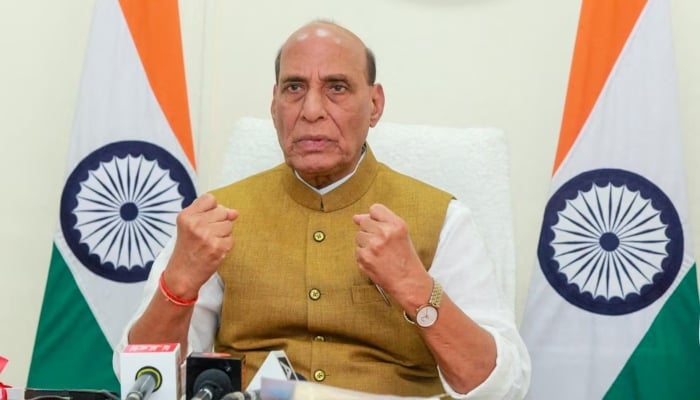Letter of protest
Sindh is not an imaginary or emotional fantasy; it is a living, breathing and established reality
November 28, 2025

Through this publication, I wish to convey this letter of protest to Indian Defence Minister Rajnath Singh on behalf of the patriotic Sindhi Hindu community of Pakistan, expressing our deep concern, sorrow, and anger over the recent statement delivered by him at a so-called Sindhi Samaj Samelan event in New Delhi.
Your statement suggesting that Sindh may, at some point in the future, undergo a geographical change and become part of India constitutes a clear violation of international law, the United Nations Charter, and established norms of international diplomacy.
Such irresponsible, provocative and unnecessary remarks are not expected from a person holding a highly responsible position, especially in a region where political and geographical sensitivities are already at an extremely delicate point.
As the patron-in-chief of the Pakistan Hindu Council, I wish to put it on record, clearly and unambiguously, that the Sindhi Hindu community residing in Pakistan neither considers your statement a threat nor takes it seriously. We are fully aware that this was a politically motivated and provocative remark made to win applause from a particular audience.
However, what is deeply regrettable and condemnable is your deliberate attempt to exploit the emotions of the innocent Sindhi Hindu community for domestic political gains, thereby placing us in an uncomfortable position before our fellow Pakistani citizens.
At the time of partition in 1947, the Sindhi Hindu community, including my Vankwani family, placed unconditional trust in the historic speech of Quaid-e-Azam Muhammad Ali Jinnah delivered on August 11, 1947, in which he guaranteed equal rights and protection to all citizens of the new state, regardless of their faith.
Relying on his vision, thousands of Sindhi Hindus, who had been living on this soil for centuries, chose not to migrate and instead contributed wholeheartedly to the development and prosperity of Pakistan.
You referred to one Advani in your speech who left Sindh, but it must be noted that even today, many patriotic Pakistani Sindhi Hindus from the Advani family continue to live in Sindh with dignity, loyalty and pride. Some prominent Hindu families include the Ranu family of Umerkot, the Rajput families of Nagarparkar and numerous families from the Bhil and Meghwar communities of Tharparkar.
Historically, when Quaid-e-Azam demanded the separation of Sindh from the Bombay Presidency in his famous Fourteen Points, several Sindhi Hindu leaders, Dewan Bahadur Govindram M. Gokhale, Dewan Narayandas Anandji and Seth Naoomal Hotchand, were on one page to endorse this demand.
Their historical contributions stand as proof that Sindhi Hindus were not merely passive witnesses but active participants in the Independence Movement in shaping the destiny of this region.
Sindh is not an imaginary or emotional fantasy; it is a living, breathing and established reality. The people of Sindh, regardless of their religious affiliations, made their decision clear to the world in 1947.
Today, Sindhi Hindu citizens contribute to Pakistan in every field. The most respected and honest chief justice in the judicial history of Pakistan, Justice Rana Bhagwandas, also belonged to the Rajput Sindhi Hindu community.
Let me make it absolutely clear once again that the emotional narrative you attempted to construct, based on religious or historical connections with Sindh, has been completely rejected by the patriotic Sindhi Hindus of Pakistan.
While the civilisation of Sindh is ancient and shared across many centuries, its political reality and national identity today is entirely and unquestionably Pakistani.
Finally, I would also caution that if the modern world starts redefining borders on the basis of historical claims, many territories of today’s India could become the subject of controversial debates. A defence minister of a nuclear power is therefore expected to demonstrate far greater maturity, restraint and awareness of his words and position.
All peace-loving people on both sides of the border, including myself, hope that you will review your statement, withdraw it immediately in the spirit of responsibility, instead of aggravating historical wounds.
The writer is a member of the National Assembly and patron-in-chief of the Pakistan Hindu Council. He tweets/posts @RVankwani
Disclaimer: The viewpoints expressed in this piece are the writer's own and don't necessarily reflect Geo.tv's editorial policy.
Originally published in The News











